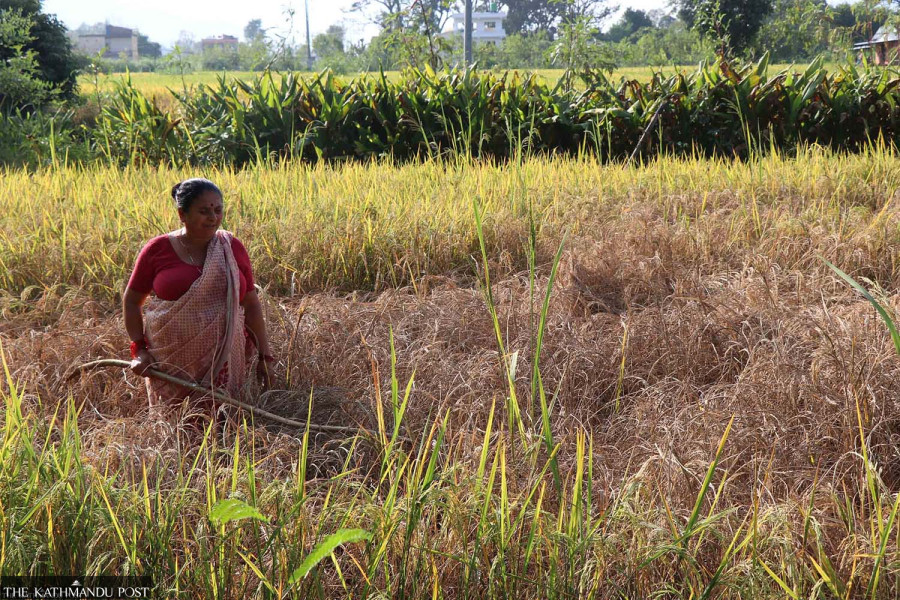Money
Insect infestation damages paddy crops in Palpa
Plant feeders have infested farms in Madi, Rampur, Argali and Kachal, known as the district's food basket.
Madhav Aryal & Ramesh Kumar Paudel
Hari Maya Gautam of Rampur Municipality in Palpa is looking at a disastrous paddy harvest this year as around 80 percent of her crop has been diseased.
An insect known as hopper—plant feeders that suck plant sap from grass, shrubs or trees—has infested farms in Madi, Rampur, Argali and Kachal, known as the district's food basket.
The plants became afflicted from the flowering stage. “I asked for help from the concerned authorities but they ignored me,” said Gautam.
Last year, Gautam harvested 7.2 tonnes of paddy from her fields. “This year, it looks like 80 percent of the paddy crop has been damaged.”
Ambika Dotel of Rampur-5 is suffering from the same problem. Her paddy plants have turned yellow.
“The plants have dried up and turned into hay,” said Dotel. “The insects have sucked the sap from the plants. The paddy crop has been a disaster this year."
The farmers obtained their paddy seeds from the municipality which distributed them at a subsidised rate. The seeds which cost Rs78 per kg were sold at a 50 percent discount.
“Cooperatives, farmers groups and individual farmers bought the seeds which were received as grant,” said Ram Hari Pandeya, chief of the agriculture section at the municipality.
According to the municipality, it distributed 20 tonnes of Sabitri seeds, 4.5 tonnes of Sama Mansuli and 2 tonnes of Bahu Gudi.
The Sabitri and Sama Mansuli seeds were distributed as per the farmers’ demand, but the crops of these varieties failed.
“We don’t know what to do,” said farmer Jyam Bahadur Rana of Rampur-5. “I have never seen this problem in the last two decades.” Rana claimed the problem occurred due to bad seeds.
Hoppers have infested paddy crops on hundreds of hectares in Palpa. Paddy farmers, who had faced irrigation and fertiliser-related issues during the transplantation, are worried about a further reduction in their harvest.
“Farmers have informed us about the outbreak of the disease,” said Milan Gaire, an expert at the Agriculture Knowledge Centre. “We have urged the farmers to be aware of the issue and use pesticides following instructions given by technicians.”
Previously, the disease had hit spring paddy too. Since the hoppers jump and fly, they can infest large paddy fields. Paddy is cultivated on 8,750 hectares in Palpa.
Paddy farmer Surath Bahadur Paudel from Sundar Basti in Bharatpur, Chitwan is worried about another problem. His paddy crop has not produced kernels.
Paudel has been growing Sama Mansuli variety on his 1.15-hectare farm for the past three years, and never had any problem.
Farmers will start harvesting the paddy crop in November. Paudel has lost hope of a good harvest. “I don’t think the plants will produce kernels by the time of the harvest,” he said.
The grains of Sama Mansuli are slender and consumers like them, according to Paudel. “Good harvests in the past encouraged me to continue planting it.”
Paudel is not the only farmer in the area with this problem. The paddy crops on the fields of farmers Chandrakanta Ghimire and Ghannath Sapkota have also failed to produce kernels.
“While other varieties of paddy have ripened, the Sama Mansuli variety has not.” Sapkota said.
Farmers have blamed the seeds, but the seed supplier denies that is the problem.
Paudel had bought the seeds at Rs85 per kg from Garibi Niwaran Sana Kisan Agriculture Cooperative at Patihani.
Jeevan Dawadi, manager of the cooperative, says they have not had any complaints about the seeds.
"The cooperative sold around 2 tonnes of Sama Mansuli seeds this season," Dawadi said.
The seeds sold to the farmers were produced by Unnat Bijbriddi Company of Patihani.
Umanath Paudel, chairman of the company, accepted the issues related to Sama Mansuli.
“Farmers around Patihani at Dhanauji, Baraunji and Sundar Basti have complained that the plants have failed to produce kernels,” Paudel said. “I have faced the issue in my own field.”
The problem has been seen in the northern parts of Chitwan district, according to Min Bahadur Pun, information officer at the Agriculture Knowledge Centre in Bharatpur.
“The issue has been seen mostly in the Sama Mansuli variety. Paddy experts at the National Paddy Investigation Programme at Hardinath discussed the problem after receiving complaints from farmers,” said Pun.
“A swarm of insects had covered the rice fields during the flowering period,” said Pun. “The experts, during the discussion, said those insects might have consumed the pollen causing rice panicle blanking.”
Pun said they were looking into it. “We are studying the impact of the issue, affected areas, possible reasons and ways to compensate the farmers.”




 9.83°C Kathmandu
9.83°C Kathmandu
1.jpg)















